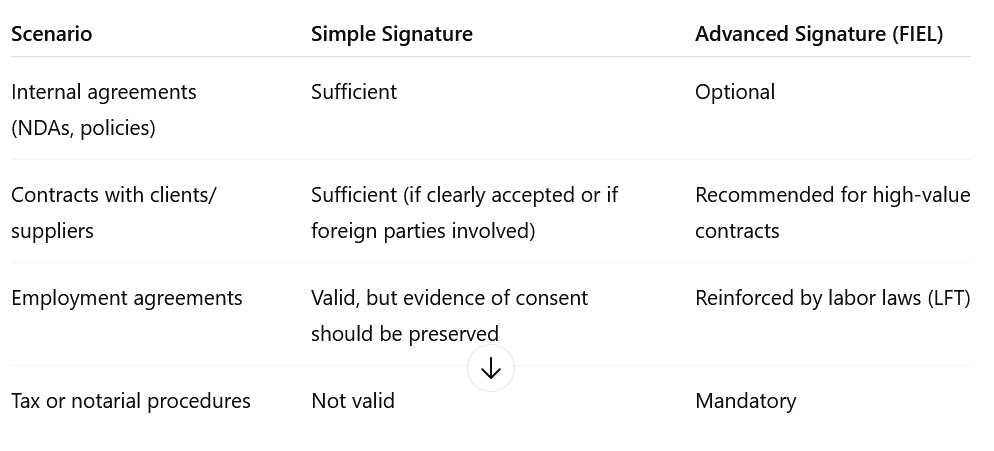More and more companies are asking whether contracts signed electronically are valid under Mexican law—and more importantly, whether such contracts can be used as evidence in the event of a dispute or litigation. As legal and commercial processes become increasingly digital, understanding which types of electronic signatures are legally valid in Mexico is essential to avoid unnecessary legal and operational risks.
An electronic signature is a set of data used to identify the signatory of a digital document. It can replace a handwritten signature in many legal acts, provided it meets certain requirements for authenticity and integrity, ensuring that both parties have clearly given their consent. Electronic signatures are now commonly used in commercial, employment, tax, and banking contracts, as well as in procedures with government agencies.

Both types are recognized under the Mexican Commercial Code, but the advanced electronic signature (also known as a certified e-signature or FIEL) holds greater legal weight. According to Article 97 of the Commercial Code, an advanced e-signature is equivalent to a handwritten signature when it guarantees authenticity, message integrity, and non-repudiation.
The following are the main legal frameworks that regulate and validate the use of electronic signatures in Mexico:

While simple e-signatures are valid in many contexts, they do not carry the same evidentiary weight in litigation. In a legal dispute, parties must prove the authenticity of a simple signature, whereas an advanced e-signature (such as SAT’s e.firma) is presumed valid and more difficult to challenge.
Failing to understand the legal implications of electronic signatures can lead to:
For sensitive or high-value transactions, we strongly recommend using advanced or certified electronic signatures.
To mitigate legal risk and ensure validity, follow these best practices:
Platforms such as Mifiel, Lexgo, and Signaturit already integrate SAT’s e.firma into their workflows.
Yes, electronic signatures are legally valid in Mexico, but not all signatures are created equal. Using the appropriate type of signature in the right context is key to ensuring legal certainty and enforceability of your contracts. Evaluating the legal risk and value of each document will guide your decision.
At Singular Law, we help business owners and companies implement legally secure e-signature schemes for their contracts and operations. Contact us to review your case.
We're ready to help. Our team has a 24-hour response time.